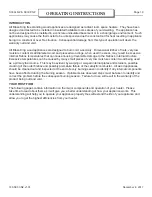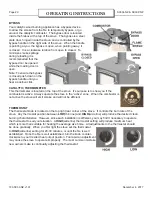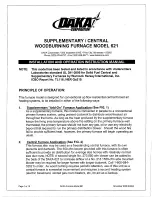
180.SC30.NZ v1.01
December 4, 2017
Page 33
SC30L.NZ & SC30P.NZ
ASH REMOVAL
This appliance is required to be cleaned frequently because soot, creosote and ash may accumulate. Wait
until the appliance is fully cooled off before the removal of ashes.
ALWAYS REMOVE THE ASH BUCKET
IMMEDIATELY AFTER FILLING
. Ashes should be removed any time they come within one inch of the door
opening. It is not necessary or advisable to completely remove all of the ashes when cleaning this appliance.
Wood burns best in a bed of ashes 13mm thick. Ashes should be placed in a metal container with a tight fi tting
lid. The closed container of ashes should be placed on a noncombustible fl oor or on the ground (outside), well
away from all combustible materials, pending fi nal disposal. If the ashes are disposed of by burial in soil or
otherwise locally dispersed, they should be retained in the closed container until all cinders have thoroughly
cooled. Other waste shall not be placed in this container.
NEVER STORE HOT ASHES IN A GARAGE OR BASEMENT. HOT ASHES WILL GENERATE
CARBON MONOXIDE AND / OR FLAMMABLE GASES. THESE GASES MAY CAUSE
SUFFOCATION AND POSSIBLE DEATH.
CHIMNEY MAINTENANCE
The most effi cient method to sweep the chimney is using a hard brush. Brush downwards so soot and
creosote residues will come off the inner surface and fall to the bottom of the chimney where they can be
removed easily.
The chimney must be checked regularly and if creosote has accumulated, it must be removed without delay.
Cleaning on a regular basis should be suffi cient during the coldest months.
ENSURE THE BYPASS DOOR
IS OPEN PRIOR TO CLEANING THE CHIMNEY SO THE SOOT AND CREOSOTE FALLS INTO THE
FIREBOX.
Chimney / Flue Inspection:
1. The chimney should be inspected regularly during the heating season.
2. If possible, the chimney should be dismantled and cleaned.
3. The chimney should be inspected for possible damage.
4. If it is in good condition, put the chimney back in place; otherwise, it must be replaced.
FIRE EXTINGUISHERS AND SMOKE DETECTORS
All homes with a solid fuel burning appliance should have at least one fi re extinguisher in a central location,
known to all, and at least one smoke detector in the room containing the appliance. If it sounds an alarm,
correct the cause but do not de-activate or relocate the smoke detector.
MAINTENANCE
















































